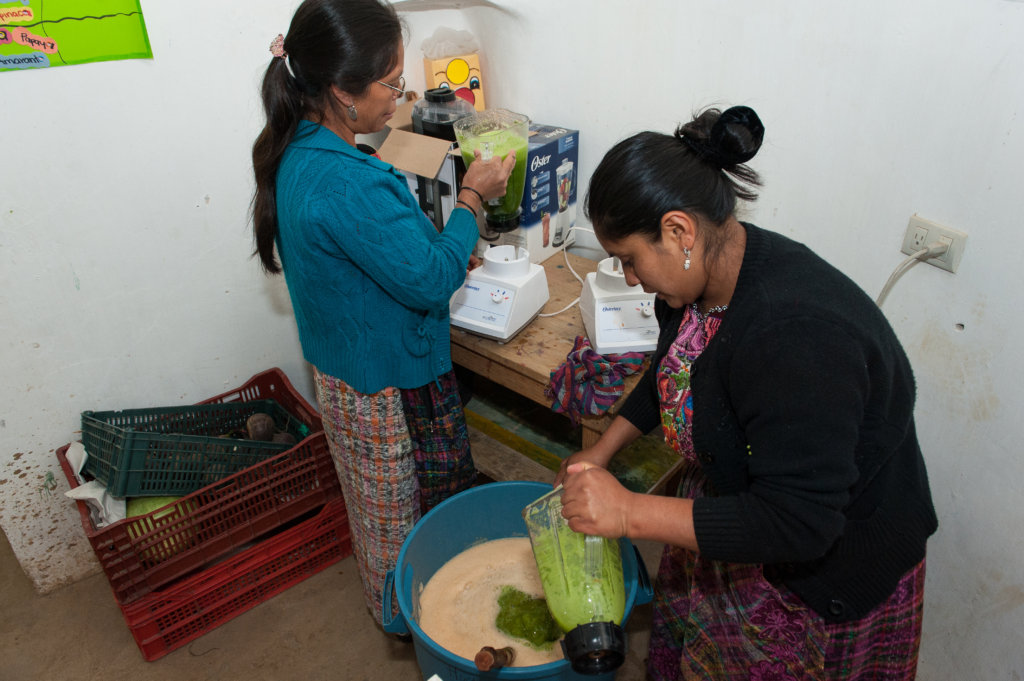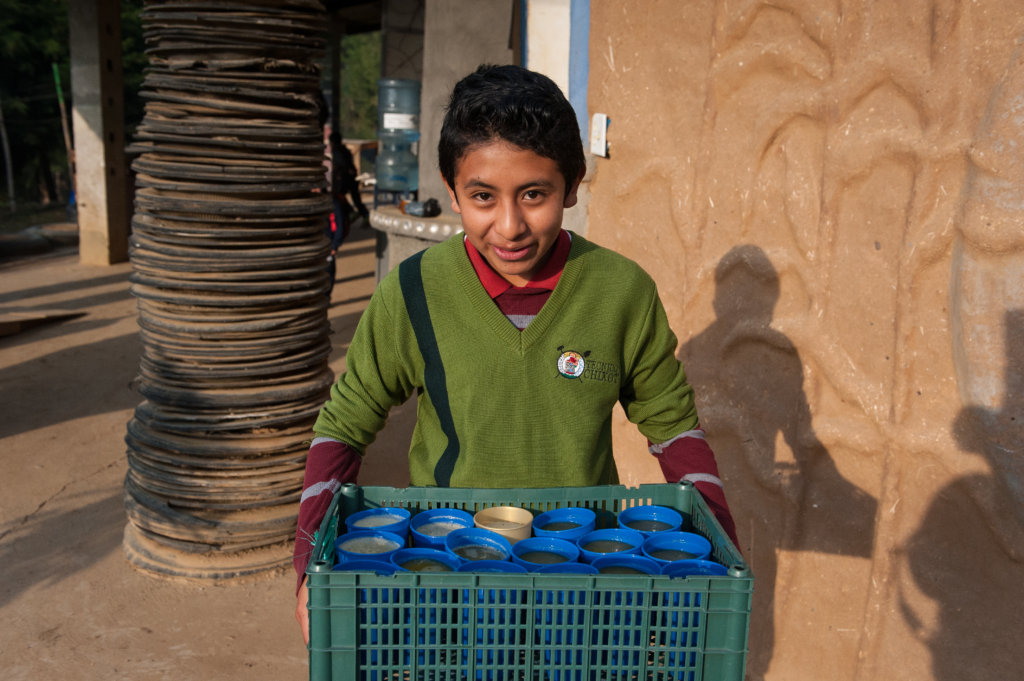By Robin Rutchik | Project Manager
This project report is a submission to GlobalGiving’s 2017 Fail Forward Contest, where organizations are asked to share a story of when they tried something new that didn’t go as planned and how they learned from it. Enjoy!
In 2015, a survey conducted by Gabriela Queme revealed that more than 30% of our students were arriving to school each morning with very little to nothing in their stomachs. This resulted in lack of attention during school, acting out, and most commonly stomach aches from hunger. As an organization we decided that something must be done to remedy this and improve their studies as well. We decided to start a "Licuado Program" - giving fruit smoothies to all the students each morning. The idea was not just the fruit smoothies (which is something very common in the community), but to then be able to add in nutritious elements such as greens (spinach, kale or chard) also flaxseed and amaranth - which we could grow in our gardens. The really great part about the Licuado Program was that it wasn’t solely the idea of foreign administrators. We posed the problem to the parents and they started a committee of 12 mothers to do all the organization and planning needed to begin the program.
At the beginning it was a beautiful collaboration of the NGO administrators simply guiding the mothers in some organization and we quickly found out that management of other parents is where they succeeded. They came together and donated majority of the tools needed for the program - all the cups, cutting boards, knives and one of the blenders. LWH provided another blender and juicer. It was decided that the program would be run by three to four mothers who volunteered to help each morning accompanied by one staff member to provide support and help cut fruit.
The parents initially developed the menu, but staff members saw a need to compromise on ingredients. While the mothers were used to smoothie recipes based on just fruit and sugar, staff members wanted to avoid adding sugar and instead add a choice of greens or flaxseed. Nonetheless, neither of these guidelines lasted. After the first week the mothers said that the kids were not drinking them because the smoothies needed sugar. We negotiated to just one cup of local honey for the entire barrel. They said this approach still wasn’t enough, so we re-negotiated to one cup of honey and one cup of brown sugar. We experimented with beets and carrots, but most kids were not fans of these additions.
As the program progressed it became clear that on days when a LWH staff member was not there to help, no greens or flaxseed were added in. One day we came back and the ENTIRE 5lb bag of sugar was used in just one day, when it should have been a week’s supply. We realized that the education behind the core reasoning for the program was missing. The parents knew their kids were hungry and they were suffering in their courses. But they did not know enough about healthy and balanced diets to understand the value of the added nutrients (flax/amaranth and greens). If they understood these reasonings for including strange new foods rather than simply being told they were “better”, the parents may have been more motivated to follow the guidelines.
Lamentably, concerns about the nutritional content of the smoothies were not the only issue with the program. A stark reality of Guatemalan culture is that there can be a tendency towards jealousy and harmful gossip. Problems stemming from these counterproductive behaviors eventually destroyed the committee of mothers. They all pushed each other out, one mother after another. Mothers would stop showing up for their duty. This was exacerbated by the fact that no one could agree on a consequence that was appropriate and that would not be detrimental to a low-income family. Soon only half the committee was coming, then they were only coming a few times a week instead of everyday. Eventually we had to just hire two people to come and prepare the licuados each morning. Besides the interpersonal conflicts with the committee, there were financial complications as well. It became a hassle for school staff to organize buying the necessary fruits and the whole endeavour was prohibitively expensive.
While these conflicts led to the unfortunate end of the Licuado Program, this is not to say that there were not substantial benefits and lessons learned. In the one school year this smoothie program ran, there were many successful outcomes. The teachers noted that the smoothies had a positive impact on school performance. The students were a bit better behaved in class and fewer kids went home sick or with stomach aches throughout the year. Students did have to go to the bathroom more often but overall were more focused in class. In community surveys, many parents expressed their deep gratitude for the program. For lots of families, it was one of their favorite things about our school.
The Licuado Program was one of the first projects that community members beyond our employees took a big leadership role in. We always talk about how LWH is constantly experimenting with green construction methods, but we are also always trying out new ideas and processes in the rest of our work. This was an experiment with local leadership in which we learned a lot about how best to guide community members and what resources they might need to successfully implement a program. One of the key takeaways was the need for education first. In the case of the smoothies, if we had spent more time up front providing nutritional information then the committee might have better understood our perspective on the ingredients. Learning from this example, we have taken a different approach with our curriculum development. Currently many of our teachers are involved with creating a unique curriculum based on the principles of democratic education and hands-on learning. At the beginning of this process we spent a lot of time discussing the philosophies of democratic education and making our goals clear. We believe that taking the time to make sure everyone is on the same page and has all of the necessary resources has been instrumental.
Another fundamental lesson from this experience was the need for clear organization from the beginning. Not only did the committee of mothers not begin with strict guidelines and well-defined expectations, but there were also no consequences for not completing their duties. We should have set up reasonable consequences before starting. Similarly, on the financial side there could have been more initial organization to create a more realistic budget and system of purchasing required materials. Although we wanted the committee of mothers to really take charge of this program, they really needed more organizational support and direction. Just how much responsibility they needed to take on was perhaps too unclear. We wanted to give them the opportunity to run the program but we also had certain requirements that we wanted to meet, which ultimately created an unclear situation.
All in all, we are proud that we were able to feed each of our students a smoothie every day for a full school year. We remind ourselves of the benefits that this experiment provided the members of our school and we feel fortunate for the learning opportunity. In our current programs we have improved in our approach to better support local leadership through initial education and more thorough organization.
Long Way Home believes that we only truly succeed in innovation when we are honest and open about our missteps and learn from them. Since we are always experimenting, we are constantly evolving based on what works well and what needs adjustment, whether it is through education, construction or administration. We are proud to be a part of GlobalGiving’s Fail Forward initiative and grateful for the opportunity to share what we learned from our delicious failure.
~Thank you, Gracias y Matiyox!
By Terrance Lee | Intern
By Daniel Nadig | Volunteer
Project reports on GlobalGiving are posted directly to globalgiving.org by Project Leaders as they are completed, generally every 3-4 months. To protect the integrity of these documents, GlobalGiving does not alter them; therefore you may find some language or formatting issues.
If you donate to this project or have donated to this project, you can recieve an email when this project posts a report. You can also subscribe for reports without donating.


